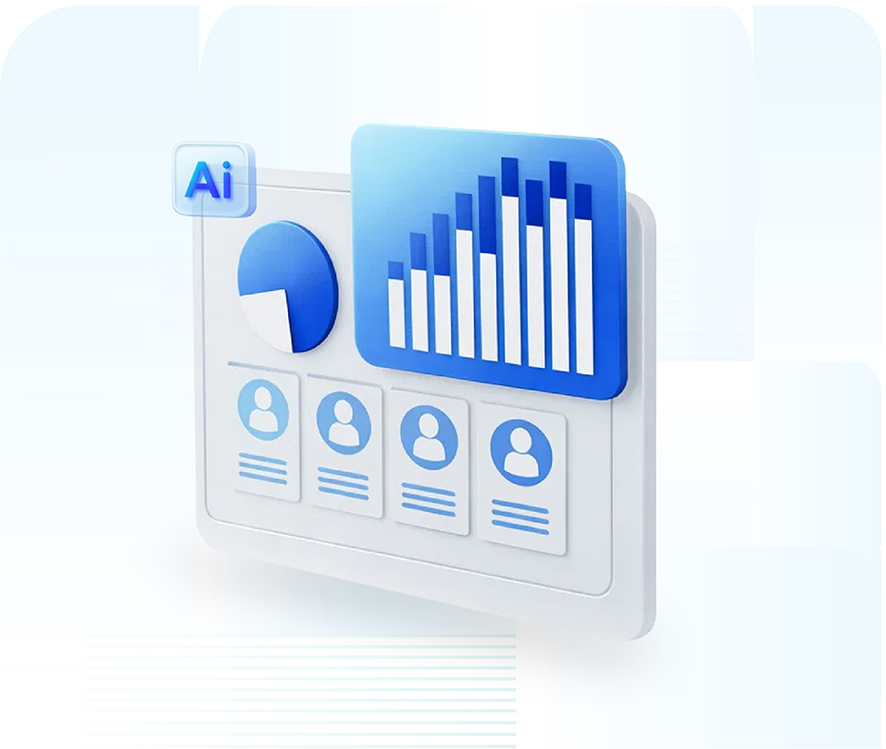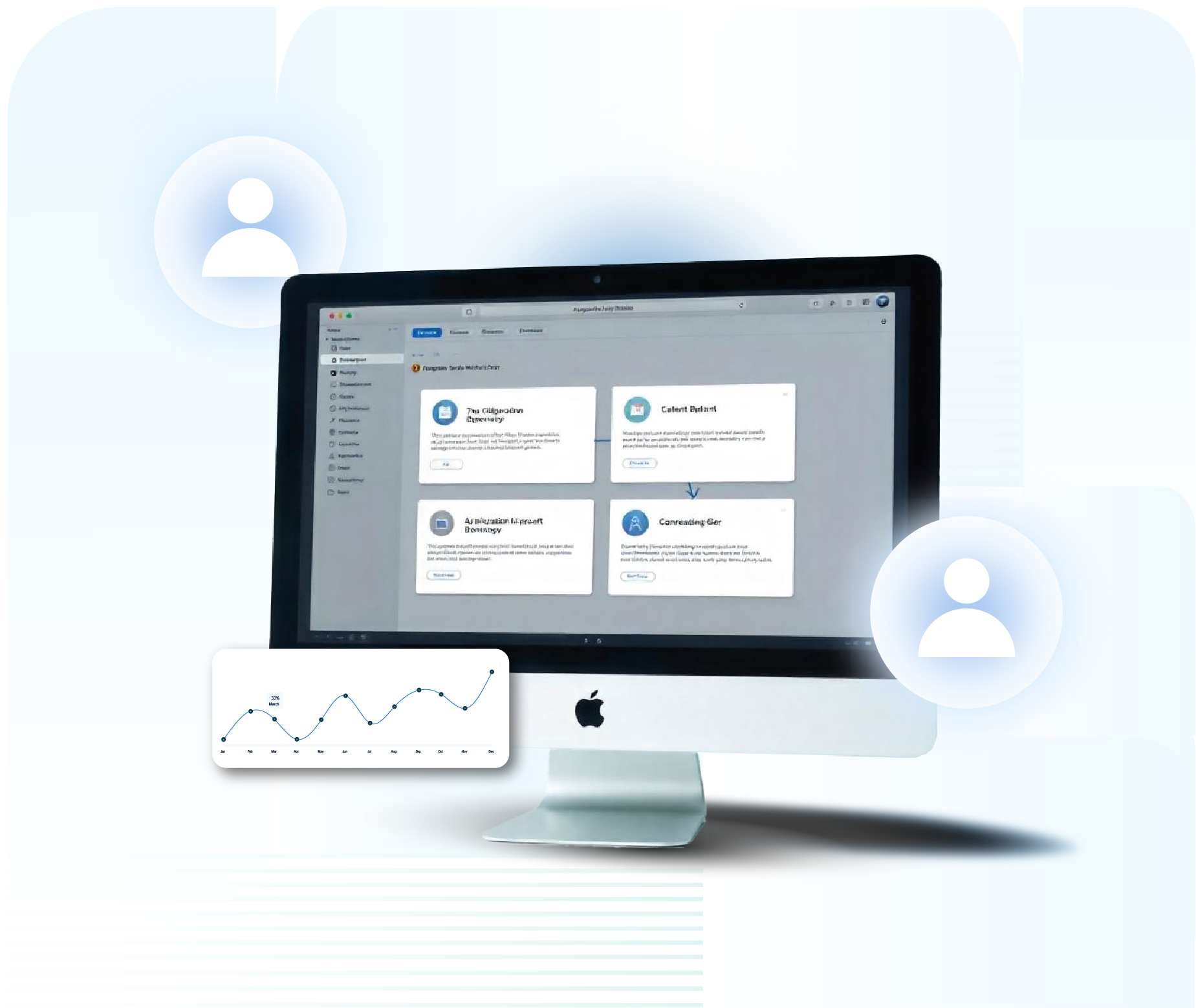Blog
Generative AI in financial services: Use-cases, implications and challenges
By Eva Kellershof Vice President Sales (North America and Europe) at NETSOL Technologies, on January 30, 2024
Dive into the transformative world of Generative AI in financial services, the cutting-edge use-cases, understand the far-reaching in this rapidly evolving sector.

A brief overview of AI and its impact
Artificial Intelligence (AI) is transforming daily lives in many ways. According to a report by Brookings, AI is reshaping the way we process information, scrutinize data and utilize the subsequent insights to refine our decision-making. AI is already transforming every walk of life, from finance to national security, healthcare to criminal justice, transportation to smart cities. It is also transforming the workplace by improving employee experience and productivity. A Forbes article highlights how AI is being used in recruitment processes to assess cognitive and emotional features of candidates while avoiding demographic biases based on gender, socioeconomic status or race.
Organizations are adopting AI to improve their operations and gain a competitive edge. A report by Deloitte states that AI can help organizations automate repetitive tasks, reduce errors and improve efficiency. According to McKinsey, the mean number of AI functionalities adopted by organizations, including natural-language generation and computer vision, has seen a twofold increase among number of respondents, rising from 1.9% in 2018 to 3.8% in 2022. Among these, robotic process automation and computer vision have consistently been the top choices each year. However, natural-language text comprehension has made significant strides, moving from a mid-tier position in 2018 to now trailing just behind computer vision.
AI adoption in the financial services industry
Artificial Intelligence is transforming the financial services industry by automating repetitive tasks, reducing errors and improving efficiency. A report by Gartner highlights five prime AI applications for financial planning and analysis (FP&A) heads to contemplate incorporating into their operations. These use-cases include fraud detection, credit scoring, customer service, risk management and compliance. Another report by Deloitte states that AI can assist banks in streamlining their back-office functions, enhancing the client experience and refining their supply chain management. According to Business Insider, close to 80% of banks recognize the promising advantages AI can bring to their industry.
Build the case towards Generative AI
Generative Artificial Intelligence (Gen AI) holds significant potential to reshape numerous facets of our existence. A prime example of such generative AI tools is ChatGPT. Serving as a conversational AI, ChatGPT employs deep learning to produce responses that mimic human interaction based on textual prompts. Its application spans various sectors, from healthcare and finance to customer support. According to a Forbes article, ChatGPT has enabled many companies to redefine and rethink the way they work, often with phenomenal results. For example, Expedia has integrated conversational AI assistance into its services, allowing customers to plan their vacations as if they are chatting with a friendly, knowledgeable travel agent. Microsoft has also invested heavily in ChatGPT and is using it to power its Bing search engine. Beyond these instances, Generative AI is employed in numerous ways to enhance our everyday experiences. For example, it can craft customized content, be it news pieces or product suggestions. Additionally, it aids in automating monotonous tasks, bolstering efficiency within establishments. In summary, Generative AI stands as a potent instrument, with its capacity to revolutionize myriad facets of our lives, prompting organizations to embrace it for a strategic advantage. Gen AI provides three main capabilities that can help businesses and institutions:
- Making online interactions conversational (e.g., conversational journeys, customer service automation, knowledge access and others)
- Making complex data intuitively accessible (e.g., enterprise search, product discovery and recommendation, business process automation and others)
- Generating content at the click of a button (e.g., creative, document generation, developer efficiency and others)
The rising numbers underscore a marked shift towards embracing Generative AI.
- According to a survey conducted in the United States in 2022, 29% of Gen Z, 28% of millennials and 27% of Gen X respondents used Generative AI tools.
- By 2025, 30% of outbound messages from large organizations will be synthetically generated, up from less than 2% in 2022.
- Generative AI will account for 10% of all data produced by 2025, up from less than 1% in 2021. The technology and consulting industries are adopting Generative AI at 35% and 30% of respective rates. In contrast, teaching and accounting industries are adopting at 19% and 16%, respectively. Healthcare has the lowest adoption rate at 15% as of 2023.
- According to McKinsey research, Generative AI features stand to add up to $4.4 trillion to the global economy annually. One-third of all respondents say their organizations are already regularly using Generative AI in at least one function-meaning that 60% of organizations with reported AI adoption are using Gen AI.
How Generative AI can transform the financial services industry
Organizations are increasingly delving into the possibilities presented by Generative AI. From generating custom content and automating design processes to creating unique solutions for complex challenges, Generative AI is becoming a cornerstone for forward-thinking enterprises. According to the Google Cloud Gen AI Benchmarking Study, 82% of organizations considering or currently using Gen AI believe it will either significantly change or transform their industry.
At the heart of it, Gen AI promises remarkable advancements in productivity and streamlining operations. This holds particularly true for the financial services sector, where contracts, terms of service and various agreements are the starting point for every product or service. One of Gen AI's standout capabilities is its proficiency in sifting through and summarizing intricate details, such as the intricacies of mortgage-backed securities contracts or the distribution of customer assets over diverse classes. Within retail, it paves the way for tailored product suggestions rooted in a customer's buying behavior and other relevant metrics. Moreover, they also play a role in risk assessment and predictive analysis, allowing financial institutions to stay ahead of potential challenges and leverage emerging opportunities.
Below are a few pivotal applications of Generative AI in the realm of financial services.
- Conversational finance: Through Generative AI, chatbots and voice interfaces can execute financial operations based on user commands. These might include tasks like verifying account balances, processing payments, setting up transfers or even providing financial guidance.
- Financial analysis: Generative AI tools, leveraging large language models, can sift through vast financial datasets, delivering insights, suggesting tactics and benchmarking performances.
- Synthetic data generation: Generative AI's ability to produce synthetic training data can enhance the accuracy of financial models and maintain alignment with data privacy standards.
- Customer onboarding: Generative AI offers an efficient way to enhance the loan origination process by directing users through form completion with conversational interfaces. Generative AI serves as a virtual consultant during customer onboarding. By analyzing the applicant's provided details, it swiftly suggests various loan alternatives tailored to their needs. For both lenders and applicants, Generative AI ensures benefits like a smooth lending journey, quicker onboarding and a faster clientele growth rate.
- Personalized product offerings: Generative AI can sift through extensive customer data to discern preferences, financial objectives and risk tolerance. Banks can utilize this insight for personalized product suggestions, investment strategies and bespoke financial counsel. By matching offerings to customer needs, banks can boost satisfaction and foster engagement.
- Fraud detection and prevention: Generative AI identifies patterns and anomalies swiftly, assisting banks in detecting potential fraud. By examining transaction history and user behavior, AI-driven systems can highlight suspicious activities, reducing risks and bolstering account security. This approach safeguards customers and reinforces their trust in banks.
- Customer support: Generative AI chatbots offer instant, tailored customer support, efficiently handling queries and assisting with transactions. Drawing from a customer's history and the latest offerings, AI provides precise, personalized responses in the user's language. This enhances support quality while reducing operational costs, potentially transforming the industry.
Challenges and risks
Integrating Generative AI into enterprise systems promises transformative results, from enhancing customer experiences to streamlining operations. However, as businesses embark on this journey, they must navigate a maze of challenges. From technical complexities and data integrity to ethical dilemmas and talent scarcity, the path to fully realizing the potential of Generative AI is laden with obstacles. Below are some of the common challenges:
- Integration with legacy systems: Integrating Generative AI with legacy systems poses challenges for businesses. Often, these systems aren't compatible with advanced AI and upgrading can be costly. To address this, companies should assess their infrastructure, pinpointing where AI can be infused without major disruptions and consider investing in AI-compatible systems.
- Lack of technical experts: A major hurdle for businesses venturing into Generative AI is the absence of in-house technical expertise. Proficiencies in Machine Learning (ML), Natural Language Processing (NLP) and computer vision are often missing. With a limited pool of skilled AI professionals available, businesses must focus on recruiting or training their staff to navigate this challenge.
- Technical complexity: Generative AI models, with billions of parameters, are intricate for many businesses. Training these models demands substantial compute resources, making them costly and less eco-friendly. Thus, most businesses will likely access Generative AI via cloud APIs with minimal adjustments in the near future.
- Data quality: Generative models thrive on quality data, but acquiring it can be expensive, labor-intensive and error-prone. Data privacy concerns further constrain data access. Thus, it's vital for these models to source dependable data, employ effective data processing methods, and adhere to ethical and legal data standards.
- Regulatory and legal considerations: Generative AI's rapid emergence brings forth unique legal dilemmas about data and content regulation, outpacing traditional legal frameworks. As businesses face evolving compliance challenges in this uncharted domain, those that swiftly adjust to changing regulations can confidently reduce risks and achieve a competitive edge.
- Ethical concerns: Generative AI's rise in business brings ethical concerns. Companies must ensure its use is responsible, accurate and sustainable. To mitigate ethical risks, organizations should utilize direct data sources, maintain updated, labeled data, involve human oversight, consistently test and seek feedback.
In the dynamic landscape of financial services, Generative AI stands out as a transformative tool, offering both unprecedented advantages and new challenges. While its capabilities can revolutionize operations, ranging from personalized client interactions to fraud detection, it's paramount that businesses navigate its adoption with an eye on ethical considerations and regulatory compliance. By striking a balance between harnessing its potential and upholding ethical standards, the financial sector can confidently embrace Generative AI as a cornerstone of its future evolution.
Related blogs

Blog
Data modernization in 2026: Building AI-ready foundations for real time business

Blog
How intelligent portals are redefining broker-to-lender collaboration

Blog



